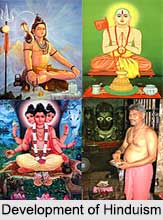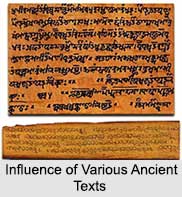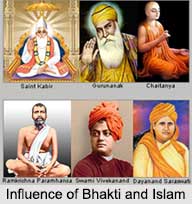 Development of Hinduism witnessed well-defined changes in the age of the Dravidians, the age of the Aryans, the period of Brahmanical revival, the age of the Bhakti and the influence of Islam and the modern age. Hinduism is a law of life which is a spirit of a past and future social evolution, which insists on testing and experiencing everything. Hinduism is the oldest and one of the most complex of all religious systems.
Development of Hinduism witnessed well-defined changes in the age of the Dravidians, the age of the Aryans, the period of Brahmanical revival, the age of the Bhakti and the influence of Islam and the modern age. Hinduism is a law of life which is a spirit of a past and future social evolution, which insists on testing and experiencing everything. Hinduism is the oldest and one of the most complex of all religious systems.
Influence of the Dravidians
The Dravidians have influenced Hinduism. It is evident among the masses and the elite especially in the South were also influenced by them. It is believed that the Dravidians were polytheists. They also held in veneration certain types of horned animals so that the worship of cow can be traced to them. The Dravidians also worshipped Lord Shiva and his consort. Many elements of Tantra can be attributed to the Dravidian culture. Many of the Indian rites are traceable to the earliest culture of the Dravidians. Dravidians have given the philosophic basis of Bhakti as enunciated by Ramanuja, Madhava and Nimbarka, Yogic conceptions behind Lord Shiva, mystical and symbolical ideas behind Hari-Hara, Dattatreya and Ardhanaarishwar. The idol-worship in the temples in the South is also a product of the Dravidian culture. Religious architecture is greatly indebted to the Dravidians.
Influence of the Aryans
The other major force that affected Hinduism was the Vedic religion of the Aryans. The basis of Hindu culture and philosophy has been provided by the Aryans. The Varnashrama, Dharma, the caste system, the religious literature and the religious and social rites have been bequeathed to the Indian culture by the Aryans. The conception of spirituality is a gift of the Aryans. Most of the Gods and Goddesses are derived from the divinities worshipped by the Aryans. Conception of one God and positive ideas about the origin of the world and the man were provided by them.
 Influence of Various Ancient Texts
Influence of Various Ancient Texts
The Upanishads re-interpreted the Vedas and furnished an intellectual explanation of God, the universe and the soul and they had arrived at these explanations from meditation and Yoga. The philosophic basis of Hinduism is the result of this period. The Gita attempted to synthesize philosophies and ideas about Bhakti and various Yogas like the Jnana Yoga, Bhakti Yoga and Karma Yoga. The Bhagavad Gita introduced the conception of incarnation. During the period of Puranic Hinduism began the worship of Lord Vishnu, Lord Ram, Lord Krishna and Lord Shiva. During this period, the leadership in religion passes to the Brahmans, and the ideas of untouchability, rigidity in the caste-system and banning of inter-marriages began.
Influence of Jainism and Buddhism
Jainism and Buddhism gave the doctrine of non-violence, insistence on morality and a certain bent of mind towards simplicity. Buddhism and Jainism had to recoil before the popular Hinduism which revived with the ideas of Bhakti and incarnations of God.
 Influence of Bhakti and Islam
Influence of Bhakti and Islam
Then the age of Bhakti and the introduction of Islamic iconoclasm do have a deep influence on the religion. Bhakti has two branches Shaivism and Vaishnavism. Shaivism worships Lord Shiva and Vaishnavism worships Lord Vishnu or his incarnations like Lord Rama and Lord Krishna.
Monotheistic ideas in Hinduism are a contribution of Islam. The devotionalism of Kabir, Guru Nanak and Chaitanya comes in an imitation of this idea. Caste system becomes watertight, women are given over to Purdah and child marriages are sanctified.
Influence of Spiritual Leaders
Spiritual leaders like Ramakrishna Paramhansa, Swami Vivekananda and Dayananda had renovated Hinduism. Caste-system was condemned. Women were free and educated. Untouchability was also not welcomed. Child-marriage was not suited to the national interests.
Thus, the religion of Hinduism now began to undergo another transformation. The essence of Hinduism is spirituality which is an awakening to the inner reality of the spirit.




















